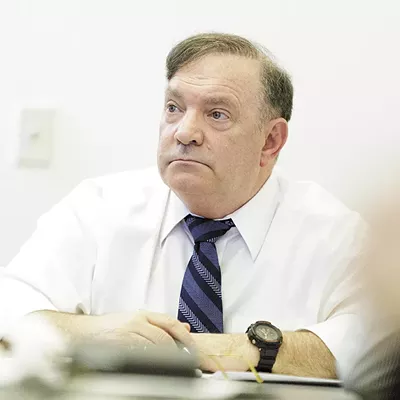But why is Steve Smith out delivering airy lectures about the future of journalism? Spokane has a journalistic crisis right here, right now, and Smith, the only one who could do anything about it, needs to tend to it. Spokane's journalistic problem is that practically everyone in town believes the newspaper did not tell readers the truth in covering River Park Square.
Last week, Smith took to the podium again, this time as part of a panel examining the Spokesman-Review's performance in covering the Jim West scandal. Grilled hard about the use of deception to get at the story, Smith made a good case that there was no way the story could have been reported without the final confirming evidence provided by their Internet ruse.
I, for one, accept that explanation. But Smith couldn't leave it at that. He had to call upon higher principles. He declared that the newspaper must pursue such stories because the Spokesman-Review's motto is: "We tell the people what we know, when we know it, without fear or favor."
But in the case of River Park Square coverage, did the Spokesman-Review tell the people what it knew, when it knew it? We know now that "loan" to the Cowles family was actually a donation; that the "emergency" meter fund was as good as spent the first day; that the "feasibility study" was not really a feasibility study; that the garage was not worth $30 million; that the Spokane Downtown Foundation was a shell organization; that the bonds that organization sold were all but worthless; that the HUD funds were in fact at risk (as Mayor John Talbott claimed); and that when citizens were assured "no tax money is involved," there were people in City Hall who secretly knew otherwise.
We didn't learn any of these things from the Spokesman-Review. We learned them from a tiny online publication called Camas magazine, and belatedly from the cascade of lawsuits that came out of the deception.
Even the Review's editors have admitted, in a mumbling sort of way, that it did not live up to the standards of truthfulness it requires of everyone else in the community.
But in sharp contrast to its nimble and unrelenting performance in investigation of West, the Catholic Church and others, the Spokesman-Review has had a hard time getting going in to the investigation of itself.
With the mall up and running and the legal dispute with the city over, why bring this up now? Because Smith himself promised there would be a final judgment on the newspaper's coverage. When Smith arrived three years ago, he affirmed he would order an internal audit, but he quickly decided the paper could not look at its own behavior while his employer's case was in the courts.
Then the Jim West investigation came up, and Smith found all his time was consumed by that. When the recall was over last November, Smith said, he finally got time to look into hiring an independent investigator to do the work. But now he was given pause by what an independent investigator would cost.
Lately Smith has talked of seeking the help of the Washington News Council. Heretofore the WNC has handled spot complaints against the media. Typically, it reviews a story or series of stories in print or on TV and hears testimony that these somehow distorted the truth. The investigation of the internal workings of a newspaper over several years would be an entirely different proposition. There are thousands of documents and perhaps 75 people to be interviewed. Such an investigation, with salary and travel to interview former Review staff members who have scattered around the country, could easily cost $50,000.
Enlisting the resources of the News Council might work -- but not as a way of saving money. If the News Council steps into the situation without sufficient resources, it will tarnish its own reputation, and in the meantime it will not do the Review any good. People in Spokane will know if they got answers or not.
If Smith decides to take the internal review seriously, he will be able to get it off to a quick start. Tim Connor, who, with his partner Larry Shook, did the River Park Square reporting that the Spokesman-Review neglected, sent Smith a 10-page memo full of detailed questions about the newspaper's performance, backed up by relevant documents.
For example, among the documents turned up in the lawsuits was the original proof sheet of a Spokesman-Review news story on River Park Square. Someone carefully edited it to soften up some of the language before it went into print. Who changed it? If it was someone on the business side of the Spokesman-Review, it is a major breech of the traditional "firewall" that is supposed to separate business and editorial matters.
Connor and Shook could never find out because Betsy Cowles would not respond to telephone calls. Perhaps an inside investigator will have more leverage.
A newspaper is a public trust just as surely as city government. Is the Review going to investigate everyone in town except itself? It's Smith's call.
William Stimson is a journalism professor at Eastern Washington University and a former Spokane Daily Chronicle reporter.
















